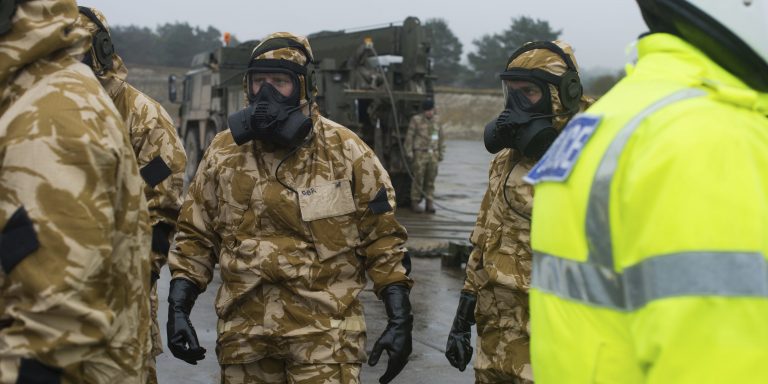INTELBRIEF
March 12, 2018
IntelBrief: Russia as a Rogue State

- On March 8, more than 180 British military personnel specializing in chemical warfare processed a large crime scene in Salisbury.
- The attempted murder of a former Russian spy and his daughter in England, using a nerve gas that is hard to acquire, bears the hallmark of the Russian government.
- A UK inquiry had previously found the Russian government responsible for the 2006 murder by polonium-210 of Alexander Litvinenko.
- From audacious assassinations to relentless disinformation campaigns, Russia is engaging in full spectrum hybrid war.
It is difficult to overstate the brazenness of the March 4, 2018, attempted murder in Salisbury, England, of former Russian intelligence officer Sergei Skripal and his daughter, Yulia. According to British officials, the two were ‘targeted specifically’ in ‘what is being treated as a major incident involving attempted murder by administration of a nerve agent.’ The type of nerve agent used and the manner of its use are not publicly known, but it is exceedingly unlikely that an attack using a nerve agent was not state-sponsored. Russia has shown a willingness to commit murder in the United Kingdom before, with the assassination of former intelligence officer Alexander Litvinenko using tea laced with the very rare polonium-210.
Sergei Skripal retired as a Russian military intelligence officer in 1999; he was convicted in Russia of passing secrets to Britain in 2006 and released in a ‘spy-swap’ with the United States in 2010. He and his family moved to England, where he was reportedly working in cyber security. In a remarkably flippant but revealing comment on the news that a ‘former Russian spy’ had been attacked using nerve gas on British soil, the Russian Embassy in London tweeted ‘He was actually a British spy, working for MI6.’ As of March 9, he and his daughter were still unconscious and in critical condition, and a British police officer who responded to the scene is in serious condition. The complications of nerve gas led the British government to respond by sending more than 180 military personnel trained in chemical warfare to help secure and process several crime scenes in Salisbury.
British officials have not stated that Russia was behind this latest incident, even with the understanding that the weapon in question is one that only a state likely possesses and wields. Still, the issue is raising uncomfortable questions of Russian actions on British soil and the government’s response to such brazen attacks if, like the Litvinenko murder, this is proved to be the work of the Russian government. Former U.K. security minister Alan West stated that if it is proven that a nation was behind the attempted murder of Skripal, ‘it is completely unacceptable. It's almost like an act of war.’ While the U.K. and U.S. certainly engage in espionage against Russian targets, the past several years have seen Moscow not only cross the lines of long-established norms of behavior in terms of active measures. but to do so without significant attempts to hide their actions.
It can be argued that Russia has become a quasi-rogue state with its occupation of Crimea and its continued proxy and direct warfare in eastern Ukraine, as well as in its dealings with the West. Russia’s relentless bot-and-troll disinformation and influence campaigns continue unabated in the U.S. and in the European Union. Moscow responds to publicly stated concerns of their consequence-free online campaigns by Western governments with either cries of ‘fake news’ or claims of ‘Russophobia,’ while dismissing the evidence of their actions and continuing them. The indictment of 13 Russian individuals and organizations by the Special Counsel looking into Russian interference in the 2016 U.S. election is just one sign that the issues are not fake news but serious matters of national security. It remains to be seen how the U.K. will respond if it determines that the Kremlin was behind the nerve gas attack; often such responses remain out of the public eye, though with the increasing audacity of Russia’s actions, a public response will likely be required as well.
.
For tailored research and analysis, please contact: info@thesoufancenter.org
[video width="960" height="540" mp4="https://thesoufancenter.org/wp-content/uploads/2018/03/Final-Edit-1-148.mp4" poster="https://thesoufancenter.org/wp-content/uploads/2018/03/AP_18068630378084.jpg"][/video]